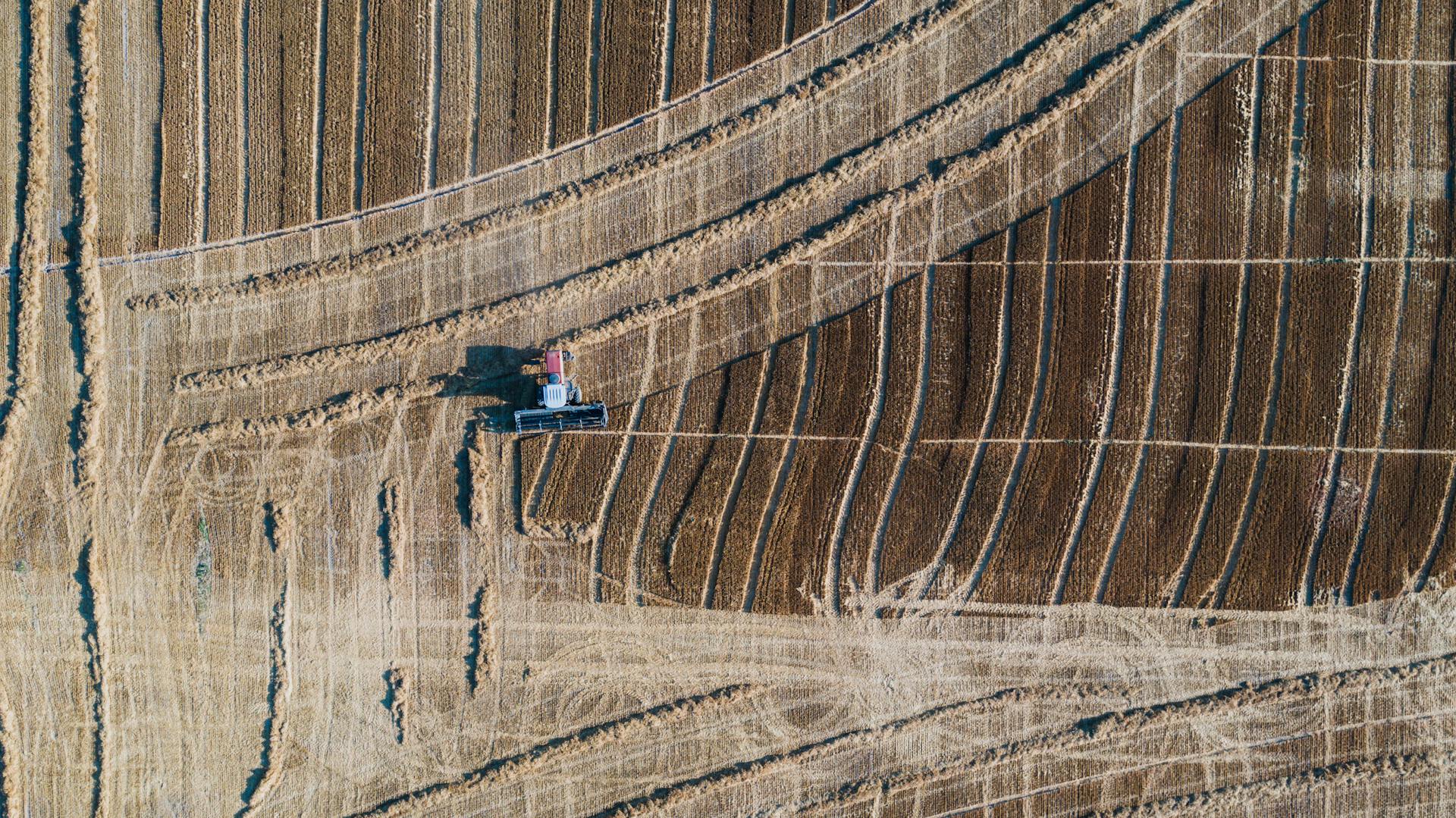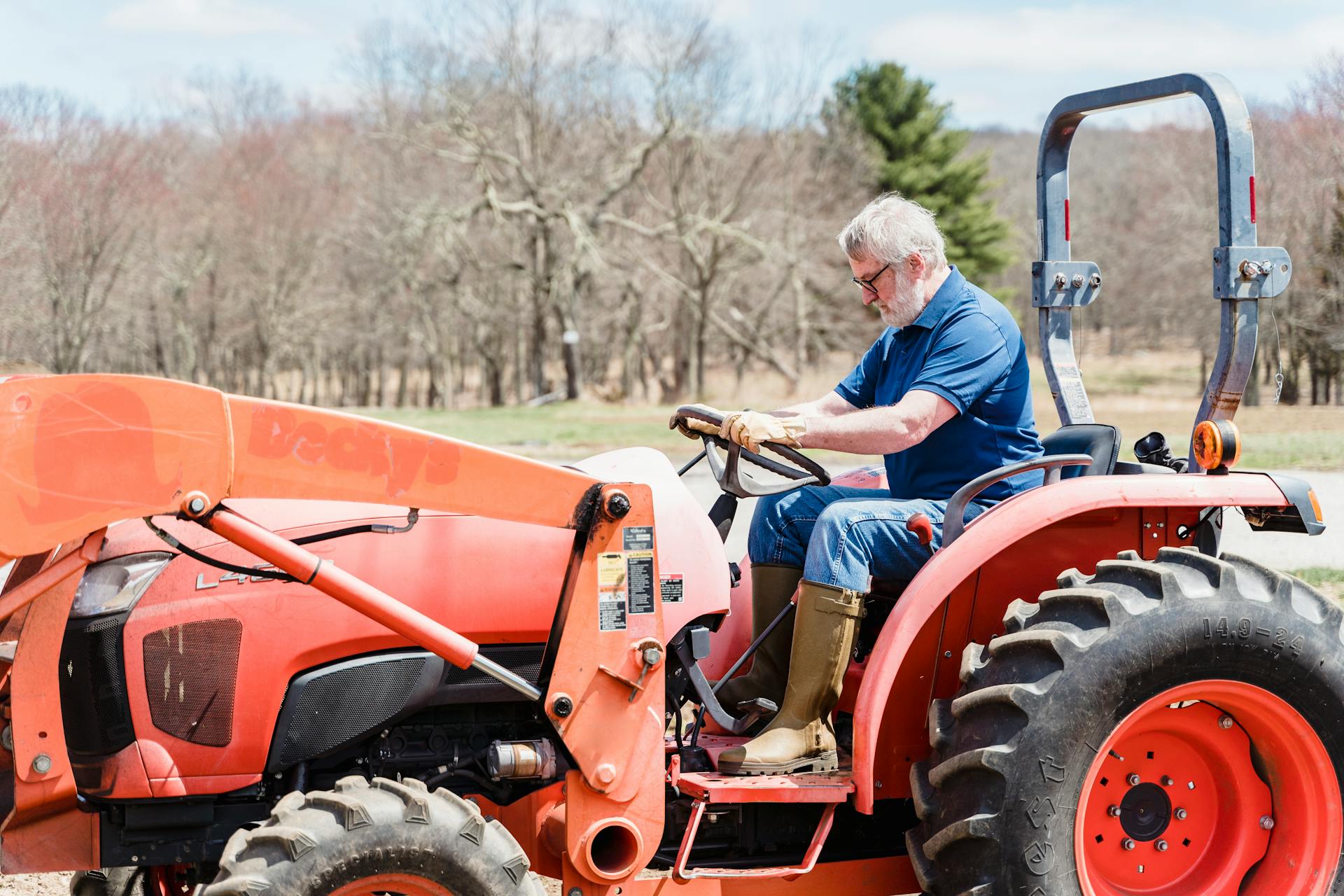
As an agricultural equipment operator, you'll be responsible for operating and maintaining a variety of heavy machinery and equipment on farms, ranches, and other agricultural settings.
You'll typically work outdoors in all types of weather conditions, often for long hours, and may be required to work on weekends and holidays.
The median annual salary for agricultural equipment operators is around $45,000, although it can vary depending on factors like location, experience, and employer.
Is This Career a Good Fit?
If you're considering a career as an agricultural equipment operator, it's essential to determine if this path is a good fit for you.
Agricultural equipment operators work outdoors in a fast-paced environment, often in challenging weather conditions. They must also be physically fit to operate heavy machinery.
You'll need to be comfortable with the idea of working long hours, sometimes in isolation, and be willing to adapt to changing weather conditions.
The job requires strong problem-solving skills to troubleshoot equipment issues and make quick decisions in high-pressure situations.
If you enjoy working with your hands and are not afraid of getting dirty, this career might be a good fit for you.
What You Need to Know
As an agricultural equipment operator, you'll need to develop a range of skills to perform your job effectively. One of the most critical skills is operation and control, which involves controlling the operations of equipment or systems.
To excel in this area, you'll need to be able to monitor the equipment's performance and make adjustments as needed. This is where operations monitoring comes in, which involves watching gauges, dials, or other indicators to ensure the machine is working properly.
In addition to these technical skills, you'll also need to be able to troubleshoot issues that arise. This involves determining the causes of operating errors and deciding what to do about it. It's not just about fixing the problem, but also about identifying the root cause and taking steps to prevent it from happening again.
Here are some of the critical skills for agricultural equipment operators, ranked by their relative importance:
Common Personality Traits
Agricultural Equipment Operators tend to have very strong Realistic interests. They often enjoy working with plants, animals, and real-world materials like wood, tools, and machinery.
Working outside is a common aspect of this occupation, with little paperwork and minimal interaction with others.
Important Abilities Needed
To be a successful Agricultural Equipment Operator, you need to have a set of specific abilities that allow you to perform your job well. Abilities are individual capacities that influence a person's information processing, sensory perception, motor coordination, and physical strength or endurance.
Control precision is one of the most important abilities for Agricultural Equipment Operators. It's the ability to quickly and repeatedly adjust the controls of a machine or a vehicle to exact positions. This is crucial for tasks like planting seeds or harvesting crops.
Multilimb coordination is another essential ability for Agricultural Equipment Operators. It's the ability to coordinate two or more limbs while sitting, standing, or lying down, without performing the activities while the whole body is in motion. This helps operators to use multiple tools or equipment simultaneously.
Near vision is also a vital ability for Agricultural Equipment Operators. It's the ability to see details at close range, within a few feet of the observer. This is necessary for tasks like inspecting crops or reading equipment manuals.
Problem sensitivity is a critical ability for Agricultural Equipment Operators. It's the ability to tell when something is wrong or is likely to go wrong, without solving the problem. This helps operators to identify potential issues before they become major problems.
Here are the top abilities needed by Agricultural Equipment Operators, ranked by their relative importance:
Education and Training
To become an Agricultural Equipment Operator, you typically need a high school diploma or GED certificate. This is the minimum educational requirement for the job.
Agricultural Equipment Operators can gain the necessary skills through on-the-job training, which can last anywhere from a few days to a few months. An experienced worker can show you the ropes and teach you how to operate the equipment safely and effectively.
Gaining hands-on experience through internships or entry-level positions on farms or nurseries can also be a great way to start your journey as an Agricultural Equipment Operator.
Required Education and Training
A high school diploma or GED certificate is usually the minimum education required to become an Agricultural Equipment Operator.
To get started, you'll likely need anywhere from a few days to a few months of training, which can be provided by an experienced worker on the job.
Having a background in agriculture, engineering, or a related field can be beneficial, but it's not a requirement.
Some colleges and universities offer programs focused on agriculture machinery or similar topics, which can be a great way to gain knowledge and skills.
Gaining hands-on experience through internships or entry-level positions on farms or nurseries is a great way to start your journey to becoming an Agricultural Equipment Operator.
Recommended read: Agriculture Machine with Name
Find Licenses
Having the right licenses can open doors to new career opportunities. For instance, agricultural equipment operators need licenses to work in their field.
You can find licenses for various careers by searching online or exploring resources in your area. Licenses vary depending on the location and profession.
Bright Outlook careers often require specific licenses or certifications. Researching these requirements can give you a head start in your career.
Job Details
As an agricultural equipment operator, your primary responsibility is to operate and control various types of machinery, including tractors, crop dusters, and harvesting equipment. You'll be working closely with farmers to understand their specific needs and objectives.
To be successful in this role, you'll need to be familiar with different farming practices, crop rotation, and the general care of plants and animals. This knowledge will help you make informed decisions about equipment operation and maintenance.
Key responsibilities of an agricultural equipment operator include operating and controlling machinery, maintaining and repairing equipment, and performing tasks such as hauling crops and fertilizing fields.
Here are some of the specific tasks you'll be responsible for:
- Operating and controlling agricultural machinery
- Maintaining and repairing equipment
- Hauling crops, fertilizing fields, and transporting farm animals
- Monitoring equipment operation to identify malfunctions or problems
The demand for skilled agricultural equipment operators is expected to grow in the future, making this a promising career path for those interested in farming and machinery.
What Is a Salary?
A salary is a payment made to an employee for their work. It's an important part of any job, and it varies widely depending on the position and industry.

The median salary for an Agricultural Equipment Operator is $32,750. This means that half of all Agricultural Equipment Operators earn more than this amount, and half earn less.
Many people earn significantly more or less than the average salary. For example, about 10% of Agricultural Equipment Operators earn less than $21,860 per year.
The average salary is $34,070, but it can be affected by extremely high or low salaries. This is why the median salary is a more stable measure of the middle of the salary range.
About 25% of Agricultural Equipment Operators earn less than $27,850, and 75% earn less than $39,340.
Intriguing read: Agricultural Equipment Operator Salary
National Hourly Wage
Farm Equipment Operator salaries can vary significantly depending on the specific job and location. The average annual salary for a Farm Equipment Operator is $29,380, which translates to $14 per hour.
This makes it an Above Average Salary, according to national data. On the lower end, they can make $21,570 or $10 per hour, perhaps when just starting out or based on the state you live in.
The type of farm equipment you operate can also impact your salary. For example, tractor operators typically earn a median annual wage of $27,540.
Your salary can also be influenced by the industry you work in. Agricultural equipment operators employed in the animal production industry generally earn higher wages compared to those working in crop production or support activities for agriculture.
Completing a degree or diploma program in agricultural or engineering-related fields can open up more career opportunities and potentially lead to higher salaries.
Key Responsibilities
As an agricultural equipment operator, your key responsibilities will be diverse and demanding. You'll be responsible for operating and controlling various types of agricultural machinery, including tractors, crop dusters, planting machines, and harvesting equipment.
You'll also need to maintain and repair equipment to ensure optimal performance, which requires a good understanding of mechanics and problem-solving skills. Performing tasks such as hauling crops, fertilizing fields, and transporting farm animals is also part of the job.
Monitoring the operation of equipment to identify malfunctions or problems is crucial to preventing accidents and ensuring efficiency. You'll work closely with farmers to understand their specific needs and objectives, which requires strong communication and interpersonal skills.
Collecting and analyzing data related to crop yields, soil conditions, and other factors to improve farming practices is an important aspect of the job. This involves using data to inform decisions and make adjustments to optimize crop growth and yields.
You'll also assist with the movement and placement of plants, trees, and nursery stock, which requires attention to detail and physical stamina. Providing support during planting and harvesting seasons to ensure timely completion of work is essential to meeting deadlines and achieving farm goals.
Here are some specific tasks you'll perform as an agricultural equipment operator:
- Operating and controlling agricultural machinery
- Maintaining and repairing equipment
- Performing tasks such as hauling crops and fertilizing fields
- Monitoring equipment operation and identifying malfunctions
- Collecting and analyzing data to improve farming practices
- Assisting with plant and tree movement and placement
- Providing support during planting and harvesting seasons
Frequently Asked Questions
Who is the largest agricultural machinery maker?
John Deere is the largest agricultural machinery maker globally, with a strong presence in North America, Europe, and Asia. Its revenue reached $35.4 billion in 2022, solidifying its position as the industry leader.
What is the SOC code for farm equipment operator?
The SOC code for farm equipment operators is 45-2091.00. This code is used to classify farm equipment operators in the Occupational Information Network (O*NET).
What is agricultural machinery equipment?
Agricultural machinery equipment refers to tools and devices that help farmers increase crop production, efficiency, and productivity. Examples include tractors, harvesters, and field management systems.
Featured Images: pexels.com


